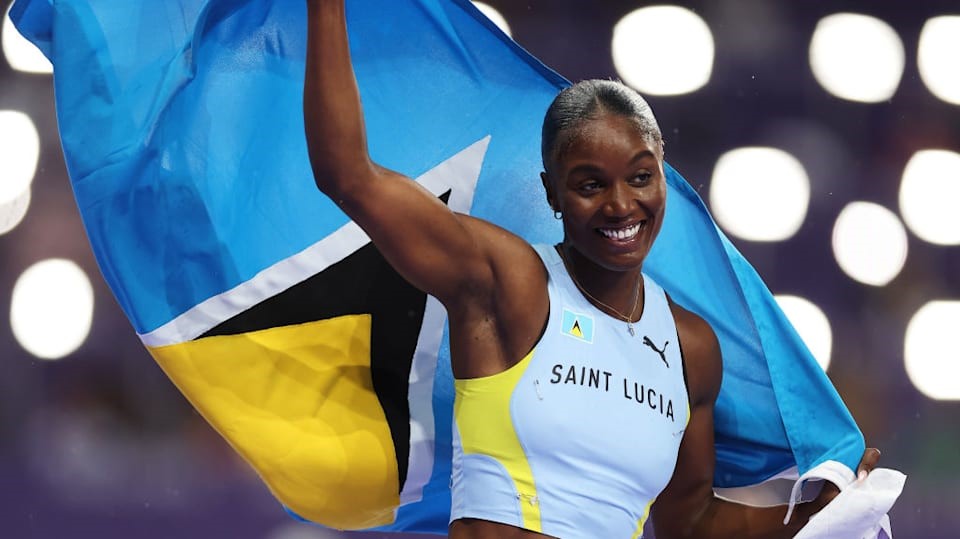The Caribbean, a region known for its sun-kissed beaches and vibrant culture, has also become a powerhouse in the world of track and field. From the sprints to the relays, athletes from this cluster of islands have dominated the global stage, bringing pride and recognition to their nations. The success of Caribbean athletes is not just a testament to their natural talent, but also to the rich history, dedicated coaching, and deep-rooted passion for the sport in the region.
The Rise of Caribbean Athletics
The Caribbean’s dominance in track and field began to take shape in the mid-20th century. One of the earliest stars was Arthur Wint of Jamaica, who won gold in the 400 meters at the 1948 London Olympics, becoming the first Jamaican to win an Olympic medal. His success was a harbinger of what was to come as the region started to produce a steady stream of world-class athletes.
Jamaica, in particular, has become synonymous with sprinting excellence. The island nation has produced a remarkable number of sprinters who have shattered world records and won numerous Olympic and World Championship medals with Jamaica and Bahamas leading the way not leaving out the island of Trinidad and Tobago. Names like Usain Bolt, Shelly-Ann Fraser-Pryce, and Elaine Thompson-Herah have become legends, Julien Alfred of St Lucia inspiring a new generation of athletes.
The Sprint Factory
The Caribbean’s success in sprinting is often attributed to a combination of factors: genetics, culture, and environment. The tropical climate allows for year-round training, while the natural athleticism seen in the region’s youth provides a strong foundation. However, the real magic lies in the coaching and development systems that have been honed over decades.
Jamaica’s Champs (Inter-Secondary Schools Boys and Girls Championships) is one of the most prestigious high school track and field events globally. It serves as a critical incubator for talent, where young athletes compete at an intense level, preparing them for the international stage. Many of Jamaica’s top sprinters, including Usain Bolt, were discovered and nurtured through this system.
In addition to Jamaica, other Caribbean nations have made their mark. Trinidad and Tobago, The Bahamas, and Grenada have all produced Olympic and World Champions. Ato Boldon, Hasely Crawford, and Kirani James are just a few of the names that have shone brightly, bringing glory to their countries.
Beyond Sprints: A Well-Rounded Competence
While sprinting is often the highlight, Caribbean athletes have excelled in other track and field events as well. The Bahamas has a strong tradition in the 400 meters and 4×400 meter relays, with athletes like Shaunae Miller-Uibo leading the charge. Grenada’s Kirani James brought his country its first Olympic gold medal in the 400 meters at the 2012 London Olympics.
In the field events, athletes like Tessa Sanderson of Jamaica (who represented Great Britain) in the javelin and Keshorn Walcott of Trinidad and Tobago in the javelin have shown that the Caribbean is not just about speed but also strength and technique.
Challenges and Opportunities
Despite the successes, Caribbean track and field faces challenges, particularly in terms of resources and infrastructure. Many athletes train under less-than-ideal conditions, with limited access to state-of-the-art facilities and support systems that are common in wealthier nations. However, this has also fostered a resilience and determination that many believe contributes to the region’s success.
There is also a growing need for more comprehensive support for athletes after their competitive careers. While some transition into coaching, commentary, or other roles within the sport, others struggle with the shift away from competition. Initiatives to provide education and career development are crucial to ensuring that these athletes continue to thrive beyond the track.
The Future: Sprinting Ahead
The future of Caribbean track and field looks bright. The region continues to produce young talent, and the infrastructure for developing these athletes is improving. The influence of successful athletes as role models cannot be understated—they inspire the next generation to aim for greatness.
As the world of athletics evolves, the Caribbean’s role in it remains significant. The region’s athletes are not just participants; they are often the stars of the show, captivating audiences with their speed, grace, and determination. Whether it’s a 100-meter dash or a 4×400-meter relay, when a Caribbean athlete steps onto the track, the world watches, knowing that something special is about to happen.
Conclusion
Caribbean track and field is a story of excellence born from humble beginnings. It is a story of nations that, despite their small size, have made an outsized impact on the world of athletics. The region’s athletes continue to inspire, not just with their performances, but with their stories of hard work, perseverance, and unyielding spirit. As they sprint, jump, and throw their way into the history books, they carry with them the hopes and dreams of their countries and a legacy that will last for generations to come.

